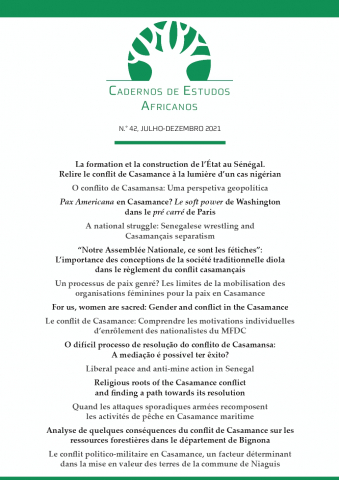For Us, Women are Sacred: Gender and conflict in the Casamance
DOI:
https://doi.org/10.4000/cea.6644Resumo
The paper examines the changes of gender relations and power inequalities in a context of nearly forty years intermittent war. It shows that gender roles have been both changing and consolidating during the conflict. Furthermore, analysis reveals a multipolar instead of a bipolar local conceptualisation of gender. Social youth differs from breadwinners on the male and mothers on the female side. The conflict has catalysed the development of new social positions for women (cheffe de ménage), new pathways to achieve social adulthood for men (combattant), reinforced customary gender relations (workload, role in the community), but it also thwarted gendered synergies in the traditional division of labour (breadwinner, childcare); being one of the contested ideological values, the conflict has finally – with certain exceptions – rather reinforced than weakened the protection of women against SGBV.
Ficheiros Adicionais
Publicado
Edição
Secção
Licença

Este trabalho encontra-se publicado com a Licença Internacional Creative Commons Atribuição-NãoComercial-CompartilhaIgual 4.0.
Autorizo a publicação do artigo/recensão submetido do qual sou autor.
Declaro ainda que o presente artigo é original, que não foi objecto de qualquer tipo de publicação, e cedo em exclusivo os direitos de publicação à revista Cadernos de Estudos Africanos. A reprodução do artigo, no todo ou em parte, noutras publicações ou noutros suportes depende de autorização prévia da editora Centro de Estudos Internacionais do Iscte - Instituto Universitário de Lisboa.

